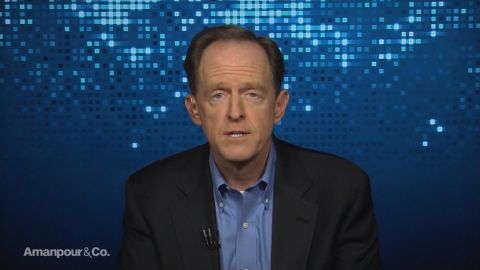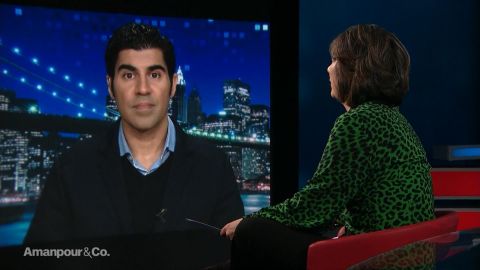Read Transcript EXPAND
CHRISTIANE AMANPOUR: How much do you see is at stake and possible to resolve this now trade showdown between the United States and China, and yet another round of tariffs and, you know, as you just heard Senator Toomey say, it’s a tax on the American people?
PARAG KHANNA: That’s exactly right. So, on the one hand there is evidence that both sides might be feeling a little bit of pain, we see decline in consumer confidence in China, for example, that may be more cyclical however than structural. Meanwhile, the senator is absolutely correct, that industry after industry in the United States, by which I mean, soybean farmers, other food exporters, steel where the costs, the rising cost of imports are being passed on to consumers, the tech sector with declining revenues in China across the American economy, when it comes to those sectors that do depend to some degree, large or small, on exports to foreign markets, particularly a rising Asian powers like China, they are suffering indeed. So, there is an incentive on both sides to come to some kind of a compromise, face saving gestures before the end of the month, and I think that that’s certainly on track to happen. But the bigger picture is certainly one where China will continue to try to displace foreign technology, foreign imports in its value chain and aggressively continue to export with its national champions to conquer foreign markets as well.
AMANPOUR: Let’s just stay quickly on this one for a second. I want to play you what Treasury Secretary, Mnuchin, has said about the process of these talks.
(BEGIN VIDEO CLIP)
STEVEN MNUCHIN, U.S. TREASURY SECRETARY: Right now, the intent is that we meet this deadline. As you know, the president is involved in a very detailed way in these negotiations and (INAUDIBLE) Lighthizer or myself and the economic team update the president, at least, weekly, in many cases daily. He’s involved in these issues. And if there are remaining issues that we can’t get closed, I think President Trump expects that he’s going to sit down with President Xi and address those issues.
(END VIDEO CLIP)
AMANPOUR: So, you know, that’s an interesting statement to end on, that if, you know, sort of worker bees can’t get it done then President Trump continues to believe in the sort of face-to-face or voice-to-voice between the top leadership, people who can actually get something done. What chances of that, do you think?
KHANNA: I think it would be unfair to the worker bees to say that, you know, they can’t resolve all the issues, the fact is that, you know, they are working on all of the issues and that each issue has a different timeline, and that’s really what’s going on here. Can we accept that they will reopen their markets or they will reduce the reciprocal tariffs on some American exports, which they’ve already said they’re going to do and are doing, and that was that enough to forestall Trump’s raising tariffs on the final batch of $200 billion worth of Chinese exports? And I think that they are probably going to get there. At the top level, it is obviously worrying, disturbing to many people in diplomacy and observe negotiations, trade or otherwise, that president — the president would allow himself to simply take the word of a foreign leader
About This Episode EXPAND
Christiane Amanpour speaks with U.S. Sen. Pat Toomey about the state of the legislature; and Parag Khanna, author of “The Future is Asian,” about why we must view Asia, not just China, as a powerful economic force. Walter Isaacson speaks with Grammy-nominated musician Jon Batiste about his musical career.
LEARN MORE


